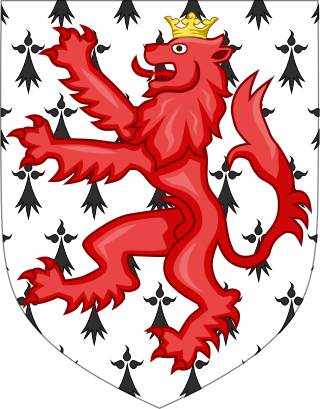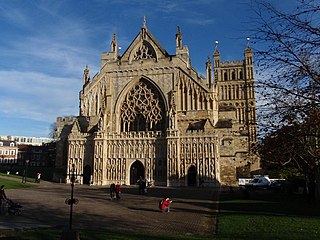Related Research Articles

John Foxe was an English clergyman, theologian, and historian, notable for his martyrology Actes and Monuments, telling of Christian martyrs throughout Western history, but particularly the sufferings of English Protestants and proto-Protestants from the 14th century and in the reign of Mary I. The book was widely owned and read by English Puritans and helped to mould British opinion on the Catholic Church for several centuries.
The Regius Professorships of Divinity are amongst the oldest professorships at the University of Oxford and the University of Cambridge. A third chair existed for a period at Trinity College Dublin.
Owen Oglethorpe was an English academic and Bishop of Carlisle, 1557–1559.

Rowland Taylor was an English Protestant martyr during the Marian Persecutions.

Robert Ferrar was a Bishop of St David's in Wales.
John Scory was an English Dominican friar who later became a bishop in the Church of England.

The Bishop of Exeter is the ordinary of the Church of England Diocese of Exeter in the Province of Canterbury. The See has been vacant since Robert Atwell's retirement on 30 September 2023.
Thomas Young was a Bishop of St David's and Archbishop of York (1561–1568).
Francis Mallet was an English churchman and academic, and chaplain to Mary Tudor.

George Coke or Cooke was successively the Bishop of Bristol and Hereford. After the battle of Naseby in 1645, Hereford was taken and Coke was arrested and taken to London. He avoided charges of High Treason in January 1646 and died in Gloucestershire that year.
Henry Cole was a senior English Roman Catholic churchman and academic.
John White was a Headmaster and Warden of Winchester College during the English Reformation who, remaining staunchly Roman Catholic in duty to his mentor Stephen Gardiner, became Bishop of Lincoln and finally Bishop of Winchester during the reign of Queen Mary. For several years he led the college successfully through very difficult circumstances. A capable if somewhat scholastic composer of Latin verse, he embraced the rule of Philip and Mary enthusiastically and vigorously opposed the Reformation theology.
William Barlow was an English Augustinian prior turned bishop of four dioceses, a complex figure of the Protestant Reformation. Aspects of his life await scholarly clarification. Labelled by some a "weathercock reformer", he was in fact a staunch evangelical, an anti-Catholic and collaborator in the Dissolution of the Monasteries and dismantling of church estates; and largely consistent in his approach, apart from an early anti-Lutheran tract and a supposed recantation under Mary I. He was one of the four consecrators and the principal consecrator of Matthew Parker, as archbishop of Canterbury in 1559.
Anthony Draycot was an English Roman Catholic churchman and lawyer. During the reign of Queen Mary he held a diocesan position as chancellor; his role in condemning numerous Protestants to death is detailed in Foxe's Book of Martyrs.
Rowland Meyrick (Merrick) (1505–1566) was a Welsh bishop of Bangor.
John Cottisford was an English churchman and academic, Rector of Lincoln College, Oxford, from 1518.

James Turberville was an English cleric who served as Bishop of Exeter from 1555 to 1559.
Thomas Fastolf, sometimes spelt Fastolfe, was an English canon lawyer and Bishop of St David's from 1352 until his death.
James Calfhill (1530?–1570) was an Anglican priest, academic and controversialist, who died as Archdeacon of Colchester and Bishop-designate of Worcester.

Nicholas Marston was a 16th century English priest. It is uncertain whether his appointment as Archdeacon of Cornwall in 1574 took effect. He was one of three brothers, who had ecclesiastical careers in the Cathedral church of Exeter, and in that diocese within Cornwall and Devon. Their father was a wealthy citizen Haberdasher in the city of London who gave financial support to the early career of his wife's brother William Bradbridge, later bishop of Exeter. Thomas's daughters made advantageous City marriages, and the network of their mercantile patronage and relations with the bishops, deans and chapters of Exeter and of Bath and Wells, and with the University of Oxford, spanned several decades of the Tudor and early Stuart period.
References
 This article incorporates text from a publication now in the public domain : "Morgan, Henry (d.1559)". Dictionary of National Biography . London: Smith, Elder & Co. 1885–1900.
This article incorporates text from a publication now in the public domain : "Morgan, Henry (d.1559)". Dictionary of National Biography . London: Smith, Elder & Co. 1885–1900.